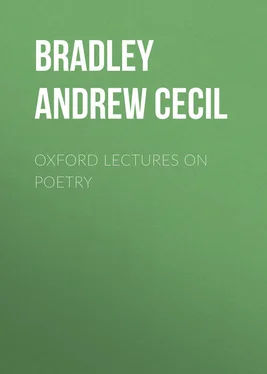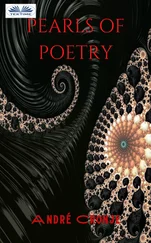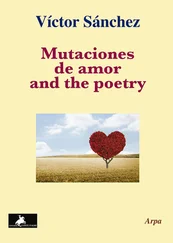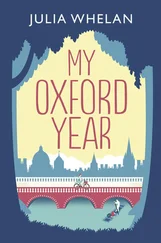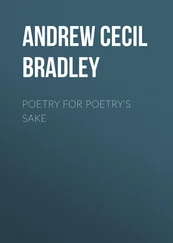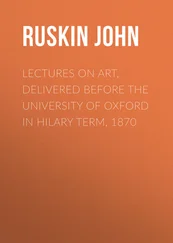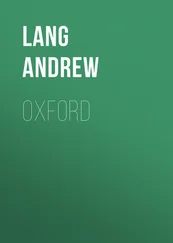Andrew Bradley - Oxford Lectures on Poetry
Здесь есть возможность читать онлайн «Andrew Bradley - Oxford Lectures on Poetry» — ознакомительный отрывок электронной книги совершенно бесплатно, а после прочтения отрывка купить полную версию. В некоторых случаях можно слушать аудио, скачать через торрент в формате fb2 и присутствует краткое содержание. ISBN: , Жанр: foreign_antique, foreign_prose, foreign_poetry, на английском языке. Описание произведения, (предисловие) а так же отзывы посетителей доступны на портале библиотеки ЛибКат.
- Название:Oxford Lectures on Poetry
- Автор:
- Жанр:
- Год:неизвестен
- ISBN:http://www.gutenberg.org/ebooks/36773
- Рейтинг книги:4 / 5. Голосов: 1
-
Избранное:Добавить в избранное
- Отзывы:
-
Ваша оценка:
- 80
- 1
- 2
- 3
- 4
- 5
Oxford Lectures on Poetry: краткое содержание, описание и аннотация
Предлагаем к чтению аннотацию, описание, краткое содержание или предисловие (зависит от того, что написал сам автор книги «Oxford Lectures on Poetry»). Если вы не нашли необходимую информацию о книге — напишите в комментариях, мы постараемся отыскать её.
Oxford Lectures on Poetry — читать онлайн ознакомительный отрывок
Ниже представлен текст книги, разбитый по страницам. Система сохранения места последней прочитанной страницы, позволяет с удобством читать онлайн бесплатно книгу «Oxford Lectures on Poetry», без необходимости каждый раз заново искать на чём Вы остановились. Поставьте закладку, и сможете в любой момент перейти на страницу, на которой закончили чтение.
Интервал:
Закладка:
WORDSWORTH 38 38 The following pages reproduce the two concluding lectures of a short course on the Age of Wordsworth, given at Oxford in April, 1903, and intended specially for undergraduates in the School of English Language and Literature. A few passages from the other lectures appear elsewhere in this volume. On the subject of the course may I advise any reader who may need the advice to consult Professor Herford’s The Age of Wordsworth , a little book which is familiar to students of the history of English Literature, and the more admired the more they use it?
‘Never forget what, I believe, was observed to you by Coleridge, that every great and original writer, in proportion as he is great or original, must himself create the taste by which he is to be relished; he must teach the art by which he is to be seen… My ears are stone-dead to this idle buzz, and my flesh as insensible as iron to these petty stings.’ These sentences, from a letter written by Wordsworth to Lady Beaumont in 1807, may remind us of the common attitude of his reviewers in the dozen years when most of his best poetry was produced. A century has gone by, and there is now no English poet, either of that period or of any other, who has been the subject of criticism more just, more appreciative, we may even say more reverential. Some of this later criticism might have satisfied even that sense of wonder, awe, and solemn responsibility with which the poet himself regarded the operation of the spirit of poetry within him; and if we desire an interpretation of that spirit, we shall find a really astonishing number of excellent guides. Coleridge, Hazlitt, Arnold, Swinburne, Brooke, Myers, Pater, Lowell, Legouis, – how easy to add to this list of them! Only the other day there came another, Mr. Walter Raleigh. And that the best book on an English poet that has appeared for some years should be a study of Wordsworth is just what might have been expected. The whirligig of time has brought him a full revenge.
I have no idea of attempting in these two lectures another study, or even an estimate, of Wordsworth. My purpose is much more limited. I think that in a good deal of current criticism, and also in the notions of his poetry prevalent among general readers, a disproportionate emphasis is often laid on certain aspects of his mind and writings. And I should like to offer some words of warning as to this tendency, and also some advice as to the spirit in which he should be approached. I will begin with the advice, though I am tempted at the last moment to omit it, and simply to refer you to Mr. Raleigh, who throughout his book has practised what I am about to preach.
There have been greater poets than Wordsworth, but none more original. He saw new things, or he saw things in a new way. Naturally, this would have availed us little if his new things had been private fancies, or if his new perception had been superficial. But that was not so. If it had been, Wordsworth might have won acceptance more quickly, but he would not have gained his lasting hold on poetic minds. As it is, those in whom he creates the taste by which he is relished, those who learn to love him (and in each generation they are not a few), never let him go. Their love for him is of the kind that he himself celebrated, a settled passion, perhaps ‘slow to begin,’ but ‘never ending,’ and twined around the roots of their being. And the reason is that they find his way of seeing the world, his poetic experience, what Arnold meant by his ‘criticism of life,’ to be something deep, and therefore something that will hold. It continues to bring them joy, peace, strength, exaltation. It does not thin out or break beneath them as they grow older and wiser; nor does it fail them, much less repel them, in sadness or even in their sorest need. And yet – to return to our starting-point – it continues to strike them as original, and something more. It is not like Shakespeare’s myriad-mindedness; it is, for good or evil or both, peculiar. They can remember, perhaps, the day when first they saw a cloud somewhat as Wordsworth saw it, or first really understood what made him write this poem or that; his unique way of seeing and feeling, though now familiar and beloved, still brings them not only peace, strength, exaltation, but a ‘shock of mild surprise’; and his paradoxes, long known by heart and found full of truth, still remain paradoxes.
If this is so, the road into Wordsworth’s mind must be through his strangeness and his paradoxes, and not round them. I do not mean that they are everywhere in his poetry. Much of it, not to speak of occasional platitudes, is beautiful without being peculiar or difficult; and some of this may be as valuable as that which is audacious or strange. But unless we get hold of that, we remain outside Wordsworth’s centre; and, if we have not a most unusual affinity to him, we cannot get hold of that unless we realise its strangeness, and refuse to blunt the sharpness of its edge. Consider, for example, two or three of his statements; the statements of a poet, no doubt, and not of a philosopher, but still evidently statements expressing, intimating, or symbolising, what for him was the most vital truth. He said that the meanest flower that blows could give him thoughts that often lie too deep for tears. He said, in a poem not less solemn, that Nature was the soul of all his moral being; and also that she can so influence us that nothing will be able to disturb our faith that all that we behold is full of blessings. After making his Wanderer tell the heart-rending tale of Margaret, he makes him say that the beauty and tranquillity of her ruined cottage had once so affected him
That what we feel of sorrow and despair
From ruin and from change, and all the grief
The passing shows of Being leave behind,
Appeared an idle dream, that could not live
Where meditation was.
He said that this same Wanderer could read in the silent faces of the clouds unutterable love, and that among the mountains all things for him breathed immortality. He said to ‘Almighty God,’
But thy most dreaded instrument
For working out a pure intent
Is Man arrayed for mutual slaughter;
Yea, Carnage is thy daughter.
This last, it will be agreed, is a startling statement; but is it a whit more extraordinary than the others? It is so only if we assume that we are familiar with thoughts that lie too deep for tears, or if we translate ‘the soul of all my moral being’ into ‘somehow concordant with my moral feelings,’ or convert ‘all that we behold’ into ‘a good deal that we behold,’ or transform the Wanderer’s reading of the silent faces of the clouds into an argument from ‘design.’ But this is the road round Wordsworth’s mind, not into it. 39 39 These statements, with the exception of the last, were chosen partly because they all say, with the most manifest seriousness, much the same thing that is said, with a touch of playful exaggeration, in The Tables Turned , where occurs that outrageous stanza about ‘one impulse from a vernal wood’ which Mr. Raleigh has well defended. When all fitting allowance has been made for the fact that these statements, and many like them, are ‘poetic,’ they ought to remain startling. Two of them – that from the story of Margaret ( Excursion , I.), and that from the Ode , 1815 – were made less so, to the injury of the passages, by the Wordsworth of later days, who had forgotten what he felt, or yielded to the objections of others.
Again, with all Wordsworth’s best poems, it is essential not to miss the unique tone of his experience. This doubtless holds good of any true poet, but not in the same way. With many poems there is little risk of our failing either to feel what is distinctive of the writer, or to appropriate what he says. What is characteristic, for example, in Byron’s lines, On this day I complete my thirty-sixth year , or in Shelley’s Stanzas written in dejection near Naples , cannot escape discovery, nor is there any difficulty in understanding the mood expressed. But with Wordsworth, for most readers, this risk is constantly present in some degree. Take, for instance, one of the most popular of his lyrics, the poem about the daffodils by the lake. It is popular partly because it remains a pretty thing even to those who convert it into something quite undistinctive of Wordsworth. And it is comparatively easy, too, to perceive and to reproduce in imagination a good deal that is distinctive; for instance, the feeling of the sympathy of the waves and the flowers and the breeze in their glee, and the Wordsworthian ‘emotion recollected in tranquillity’ expressed in the lines (written by his wife),
Читать дальшеИнтервал:
Закладка:
Похожие книги на «Oxford Lectures on Poetry»
Представляем Вашему вниманию похожие книги на «Oxford Lectures on Poetry» списком для выбора. Мы отобрали схожую по названию и смыслу литературу в надежде предоставить читателям больше вариантов отыскать новые, интересные, ещё непрочитанные произведения.
Обсуждение, отзывы о книге «Oxford Lectures on Poetry» и просто собственные мнения читателей. Оставьте ваши комментарии, напишите, что Вы думаете о произведении, его смысле или главных героях. Укажите что конкретно понравилось, а что нет, и почему Вы так считаете.
